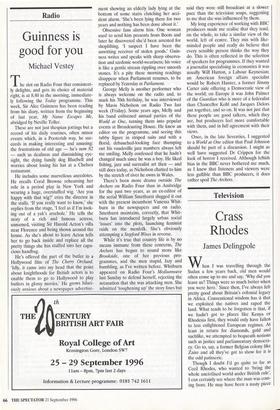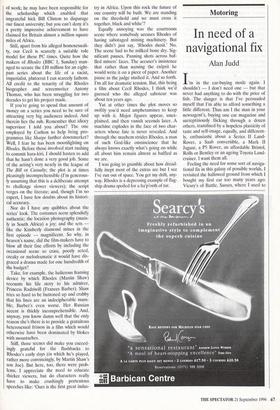Television
Crass Rhodes
James Delingpole When I was travelling through the Sudan a few years back, old men would often come up to me and say, 'Why did you leave us? Things were so much better when you were here.' Since then, I've always felt pretty good about Britain's colonial legacy in Africa. Conventional wisdom has it that we exploited the natives and raped the land. What tends to be forgotten is that, if we hadn't got to places like Kenya or Rhodesia first, they would only have fallen to less enlightened European regimes. At least in return for diamonds, gold and suchlike, we attempted to bequeath notions such as justice and parliamentary democra- cy. Go to, say, a former Belgian colony like Zaire and all they've got to show for it is the odd patisserie.
Though I doubt I'd go quite so far as Cecil Rhodes, who wanted to 'bring the whole uncivilised world under British rule', I can certainly see where the man was com- ing from. He may have been a nasty piece of work; he may have been responsible for the scholarship which enabled that ungrateful hick Bill Clinton to disparage our finest university; but you can't deny it's a pretty impressive achievement to have claimed for Britain almost a million square miles of Africa.
Still, apart from his alleged homosexuali- ty, our Cecil is scarcely a suitable role model for these PC times. Quite how the makers of Rhodes (BBC 1, Sunday) man- aged to secure the £10 million for an eight- part series about the life of a racist, imperialist, plutocrat I can scarcely fathom. All credit to the tenacity of the Rhodes biographer and screenwriter Antony Thomas, who has been struggling for two decades to get his project made.
If you're going to spend that amount of money on a series you need to be sure of attracting very big audiences indeed. And therein lies the rub. Remember that idiocy supervisor I told you about? The one employed by Carlton to help bring pro- grammes like Sharpe further downmarket? Well, I filar he has been moonlighting on Rhodes. Before those involved start rushing to commit hara-kiri, I should hasten to add that he hasn't done a very good job. Some of the acting's very nearly in the league of The Bill or Casualty; the plot is at times pleasingly incomprehensible (I'm generous- ly assuming that this is a deliberate attempt to challenge slower viewers); the script verges on the literate; and, though I'm no expert, I have few doubts about its histori- cal accuracy.
Nor do I have any quibbles about the series' look. The costumes seem splendidly authentic; the location photography (main- ly in South Africa) a joy; and the sets like the Kimberly diamond mines in the first episode — magnificent. So why, in heaven's name, did the film-makers have to blow all their fine efforts by including the occasional scene so crass, poorly acted, creaky or melodramatic it would have dis- graced a drama made for one hundredth of the budget? Take, for example, the ludicrous framing device by which Rhodes (Martin Shaw) recounts his life story to his admirer, Princess Radziwill (Frances Barber). Shaw tries so hard to be buttoned up and crabby that his lines are an indecipherable mum- ble; Barber's even worse. Her Russian accent is thickly incomprehensible. And, anyway, you know damn well that the only reason she's there is to provide a gratuitous heterosexual frisson in a film which would otherwise have been dominated by blokes with moustaches.
Still, those scenes did make you exceed- ingly grateful for the flashbacks to Rhodes's early days (in which he's played, rather more convincingly, by Martin Shaw's son Joe). But here, too, there were prob- lems. I appreciate the need to educate thicker viewers, but do characters really have to make crushingly portentous speeches like: 'Ours is the first great indus-
try in Africa. Upon this rock the future of our country will be built. We are standing on the threshold and we must cross it together, black and white'?
Equally annoying was the courtroom scene where somebody accuses Rhodes of having sabotaged mining machinery. But they didn't just say, 'Rhodes dunit.' No. The scene had to be milked bone dry. Sig- nificant pauses. Panning shots across baf- fled miners' faces. The accuser's insistence that rather than naming the culprit he would write it on a piece of paper. Another pause as the judge studied it. And so forth. I'm all for dramatic tension. But, this being a film about Cecil Rhodes, I think we'd guessed who the alleged saboteur was about ten years ago.
Yet at other times the plot moves so swiftly you'd need amphetamines to keep up with it. Major figures appear, unex- plained, and then vanish seconds later. A machine explodes in the face of two char- acters whose fate is never revealed. And through the mayhem strides Rhodes, a man of such God-like omniscience that he always knows exactly what's going on while all about him remain almost as baffled as we are.
I was going to grumble about how dread- fully inept most of the extras are but I see I've run out of space. You get my drift, any- way. Rhodes is a depressing example of flag- ship drama spoiled for a ha'p'orth of tar.



















































































 Previous page
Previous page